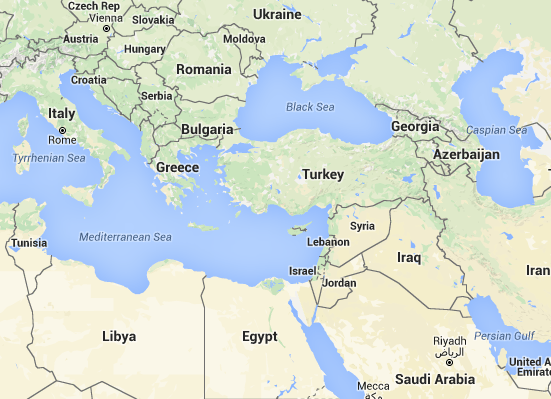Geography and history, modern and older, internal fault lines as well as external interventions, have given rise to a perfect storm in the Eastern Mediterranean. In an arc of fire that stretches from Libya to Syria and can be extrapolated further North, all the way to Russia and Ukraine, a series of conflicts have made this an area of particular instability, for the world as a whole and more immediately for nearby Europe. The flood of refugees, from Syria and other countries, is an apparent but not the only impact that this is having beyond the strict confines of the Eastern Mediterranean.
A quick review of the state of affairs in key countries of the region demonstrates the seriousness of the situation: Libya – a failed state returned to tribalism after the externally-assisted fall of Qaddafi’s dictatorship; Egypt – a regime imposed through a military coup against the democratically elected President, who was supported by the Muslim Brotherhood; Israel and Palestine – “the mother of all conflicts”, continuing unabated, with the international community’s favourite “two state solution” becoming increasingly de facto non-implementable; Syria – a disaster zone, with more than 200,000 dead over four-and-a-half years of civil war, churning refugees in their millions and attracting jihadists in their thousands; Iraq – also partly occupied by the jihadists of the “Islamic State”, or “ISIS”, “ISIL” or “Daesh”, with its own religious and ethnic fragmentation and other scars left from the 2003 American invasion and Saddam Hussein before that.
Faced with this situation, or situations, at its doorstep, what can Europe do? Not to be all doom and gloom, there are some bright spots too, which could be consolidated and built upon. Tunisia has managed to remain peaceful and cohesive throughout its transition after the Arab spring, which started there. The nuclear deal of the international community with Iran has made a potential ally and fellow problem solver out of a former foe and spoiler. Cyprus remains divided but stable, with improving relations between the two communities at leadership level; and Greece and Turkey are on rather good terms these days.
Is this enough, though? Certainly not enough to stem the flow of hundreds of thousands of refugees, which has been stretching European external solidarity and internal unity to their limits over the past several months. Neither is it enough to save Europe from terrorism, which only last Friday showed its ugly face again, in a night of bloodshed in the heart of Paris. Things on both fronts are not expected to get better any time soon, and combined with the recent financial crisis and tensions with Russia over Ukraine paint a bleak future for the once-upon-a-time much-promising European project.
Things could have been better if Europe had a unified approach to each of the Eastern Mediterranean challenges, with a clear course of action that it would pursue using its quite substantial means. With fragmentation being the order of the day these days inside Europe too, though, the tough external dilemmas look more insurmountable. Here are some of them: Continue to support the Syrian opposition and refuse to contemplate any extension of Assad’s rule, or join pro-Assad Russia and Iran and work out a compromise solution together? Go for democracy or stability when it comes to relations with the Egyptian regime? Make concessions to Turkey in order for it to hold the Syrian refugees on its soil instead of them coming to Europe, or distance itself from the increasingly authoritarian AKP government and president?
Thankfully, some progress has already been achieved on several fronts, and the choices are not as stark as they sound at first. The International Syria Support Group that has been recently meeting in Vienna brings together the US, EU, Russia, Iran, Saudi Arabia, Egypt and other key players, the combined influence of which may put Syria finally on the path of peaceful transition. There is more than one reason why Turkey, a predominantly Muslim but still tolerant and broadly democratic state, should be brought closer to the EU. Security axes that involve in various combinations Greece and Cyprus on the EU side and Israel, Turkey and possibly Egypt on the other side can serve as stabilizing factors in the otherwise volatile region. Russia can be positively engaged, and may actually want to be, as recent gestures about Syria indicate.
Europe needs to build on this positive potential and expand it throughout the region, for the region’s benefit and its own. For that, however, it needs a clear determination of its interests and unity in mobilizing political will and resources. It also needs a clear and workable vision of itself and its neighbourhood, possibly involving a variable geometry of economic and political ties that bind the broader region together for the common good.
*This article partly reflects the points raised during a discussion under the Chatham House Rule organized by European Demos on 11 November 2015 in Brussels under the title “The Eastern Mediterranean’s multiple security challenges – What (more) can Europe and the world do?”, with Dr. Thanos Dokos, Director General of the Hellenic Foundation for European and Foreign Policy (ELIAMEP), as keynote speaker, and Dr. Bahadir Kaleağasi, International Coordinator and EU Representative, Turkish Industry and Business Association (TÜSİAD), as discussion chair.



